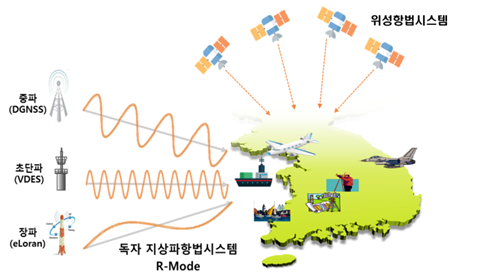Image: South Korea Ministry of Oceans and Fisheries
Blog Editor’s Note: While China still leads the world in its comprehensive approach to providing its industry and populous a reliable and resilient PNT infrastructure, South Korea is closing fast.
The nation is launching its own regional satellite to increase the precision of GPS services, has a network of differential GPS stations, is using both R-Mode and VDES for maritime, and is modernizing and expanding its Loran network. This latter initiative is in partnership with the commercial broadcaster MBC.
Yesterday’s Location Business News discussed South Korean telecom giant KT’s agreement with Swift Navigation to support centimeter level GPS-based positioning. While this initiative will add to the nation’s capabilities, it is unclear how it will be incorporated into its overall PNT architecture.
The fusion of telecom, especially 5G, and PNT services has been discussed amongst the technical community in the U.S. for some time, especially when supported by one or more resilient time sources.
China is reputed to be incorporating its time over fiber and eLoran timing signals into its 5G rollout as a part of providing highly precise PNT via its telecom network. This has been imagined for the U.S. as well. Though, to the best of our knowledge, it has not yet been acted upon, “GPS World” published a paper on the topic by two Qualcomm engineers last year.
Precise time is used in telecom networks to synchronize cell towers. Also to make better use of spectrum. The more precise, resilient, and stable a timing source, the more information can be moved through a given piece of spectrum. According to network engineers, “better timing equals found money.”
One challenge moving forward with similar telecom & PNT efforts in the U.S. is a lack of a resilient timing architecture to build upon. Last year, a group of U.S. telecom CEOs and senior executives acting as the President’s National Security Telecommunications Advisory Committee recommended President Biden begin funding a national resilient timing architecture similar to the one recommended by the RNT Foundation. A similar recommendation was made at about the same time to key members of Congress by the Alliance for Telecommunications Industry Solutions.
We understand, though, that the Office of Management and Budget continues to oppose any such initiative.
Thus, as a member of the National Security Council said in December, “GPS is still a single point of failure.”




